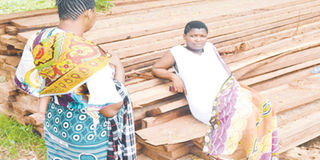Tales of expectant mothers and forest conservation

In Kilwa’s Nanjirinji-A village, women don’t have to worry about delivery kits when their time is due. The income from Mbumbila forest takes care of that.
What you need to know:
The 29-years old mother, Zainabu Hamisi resides at Nanjirinji-A village in Kilwa, South of Lindi. She has embarked on a road less travelled, where she is unable to prioritise her maternity life - she has to give equal attention to her livelihood, the Mbumbila forest.
Holding and tickling her five-month old baby boy close to her chest, a fairly plump mother is filled with smiles as she looks at her son laugh.
The 29-years old mother, Zainabu Hamisi resides at Nanjirinji-A village in Kilwa, South of Lindi. She has embarked on a road less travelled, where she is unable to prioritise her maternity life - she has to give equal attention to her livelihood, the Mbumbila forest.
The 61,274 hectare forest holds a fundamental part in her life as she not only earns her livelihood from the forest products but also receives privileges. The village’s Natural Resource Committee granted her a sum of Sh 50,000 for her delivery needs when she was expecting. “With abject poverty I am living in, purchasing a delivery kit would have cost me dearly but with the support from the village forest income, I was able to deliver safely,” says Zainabu.
The Mbumbila forest community earns Sh60,000 million per annum from the forest’s products such as logs. Logs measuring one cubic metre are sold between Sh 200,000 and Sh300, 000 each, depending on the type of the tree. So far, the village has earned a total of Sh240 million.
Common in the remote clinics, the expectant mother prepares for her own delivery supplies such as gloves, cord clamps etc, which isn’t easily affordable. Hamisi Mkweu, the village Natural Resource Committee Secretary says, “We began providing financial support to expectant mothers last year and since then about 50 mothers were given a sum of Sh50,000 each for their delivery needs, such as kits.” This year, the amount was reduced to Sh30,000 due to an increase in the number of expectant women.
Somoe Kiamba, a 28-year- old expectant mother who is about to deliver has been able to prepare herself in advance. She says, “I am relieved to have received the Sh30,000 for my delivery kit from the forest income and to be honest such benefits of the forest touch us all.”
Realising the needs and special care that the village women needed, Abdallah Mnali, treasurer of the committee says they initiated the system of providing such allowances to expectant mothers, a month before delivery. He adds, “We needed to do this, it was an eye opener to witness the trouble and struggle the expectant mothers in the village go through, especially when they lack money for delivery kits.”
The other factor that has boosted maternal health in the village is the provision of clean and safe water. The village channelled a sum of Sh27million off the forest funds for the construction of eight wells. The wells are at close proximity so that expectant mothers don’t have to walk a long distance to fetch water for basic needs. Nanjirinji-A is among villages with success stories after the government formulated a new National Forest Policy in 1998 and the enactment of the Forest Act of 2002, which provided room for people’s involvement in conservation.
Observing the success in various pilot areas and policy changes within the Ministry of Natural Resources and Tourism, a new national level programme of Participatory Forest Management (PFM) was established.
The law recognises two types of PFM: Village, Group or Private Forest Reserves (commonly referred to as “Community Based Forest Management” – CBFM) and Joint Forest Management (JFM), which allows communities to sign JFM agreements with government and other forest owners. Different models of PFM have been supported by projects, NGOs, districts and National Government since the early 1990s.
In 2008, the Tanzania Forest Working Group (TFWG) launched the pilot phase of the ‘Mama Misitu’ campaign in response to TRAFFIC’s 2007 report on illegal timber trade. ‘Mama Misitu’ campaign is a five-year communication campaign aiming to improve the governance of Tanzania’s forests and improve the legality of forest harvesting, so that the people of Tanzania can increasingly benefit from sustainably managed forests. The campaign began with the pilot phase for two years and lessons from the pilot phase made the TFWG to develop this five year implementation phase (2011-2016). Funded by the ministry of Foreign Affairs of Finland, the campaign is coordinated by the Tanzania Natural Resources Forum.
Nanjirinji-A is among the villages empowered by the campaign which led them to gain a status of a conserved forest in 2012, and thus gave room for legal harvest of timber. The campaign included helping the community put the systems needed to manage the forest in place, appoint and train the patrol team, initiate records and make sure the regulations are made aware of.
The annual revenue collected from selling timber is divided into four: 50% to the village coffers, 40% to the village Natural Resources Committee, 5% to the District Municipal Council and the other 5% to the stakeholders.
Bringing to light the challenges Nanjirinji-A village faces, Selemani Kindali, the Chairperson says, “Farmers from the neighbouring villages invade the forest illegally for their agricultural activities. They indiscriminately cut the trees of the forest land for cultivation and leave it empty. This has caused conflicts between the farmers and the villagers.”
The District Administration has however taken action by collaborating with the village to sweep away the invaders of the forest by deploying the police force.
Currently, 2 million hectares of forests are managed by over 1,000 villages countrywide. Boaz Sanga, Assistant Manager of the Tanzania Forest Services Agency (TFS) says that many of the forests in the regions of Mtwara, Lindi and Ruvuma are still unknown because they were not surveyed and demarcated.
He notes that currently TFS in the area has embarked on an exercise of surveying all the forests. He further admits that the farmers invading the forests for cultivation activities pose as a major threat to the forests in the aforementioned area.
Email: [email protected]




